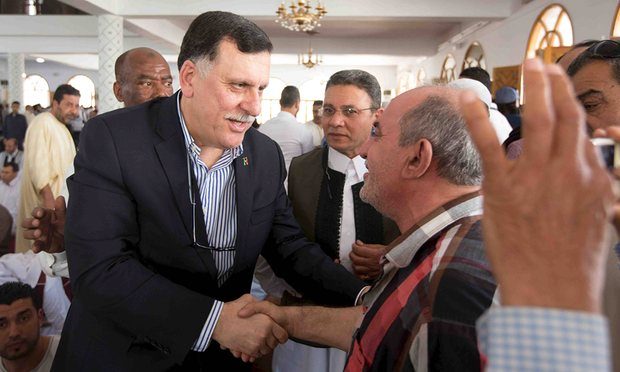EU officially offered security assistance to Libya
Government to get assistance with border and security forces as Fayez Seraj appeals for aid to fight Isis and rebuild country

The European Union has responded to a request for help from the fledgling UN-backed Libyan government by offering assistance with its security sector, managing migration, border management and police capacity building.
However, officials stopped short of explicitly saying the EU would operate in inland Libyan waters to stop people smugglers, saying it wants to disrupt their business model by building the capacity of the Libyan coastguard.
In his first video conference with EU foreign and defence ministers since setting up in Tripoli, the UN-backed prime minister, Fayez Seraj, made a broad appeal for aid to fight Islamic State and rebuild the shattered country. No explicit mention was made of the deployment to Libya of western forces, including UK troops, to train the Libyan army to develop its capacity to fight the growing threat of Isis.
The details of any request are sensitive because the Libyan government is trying to establish its independence, and the government’s efforts to win the support of the Libyan parliament will founder if it is seen as a creature of the EU or UN.
An expected vote by the Libyan parliament to support the new UN-backed government failed on Monday despite the presence of the UK foreign secretary, Philip Hammond, who urged parliament to make the endorsement.
“We are ready to support the government,” said the EU foreign policy chief, Federica Mogherini, who chaired a meeting of more than 50 ministers in Luxembourg. “Work can now start,” she told a news conference, adding that the EU was ready to provide €100m (£79m) in financial support.
Hammond, who arrived at the meeting directly from Tripoli, said he hoped training could take place in Libya or a neighbouring country. Germany has said it will not allow its security personnel to be on the ground in Libya.
Asked if a naval mission should operate in Libyan waters, the Spanish foreign minister, José Manuel García-Margallo, said: “Yes, it is very urgent.” Mogherini said EU generals had briefed her that such a move was feasible for Europe’s naval forces.
Sweden said it might also require a UN security council resolution if the mission was to try to stop arms smuggling.
[su_note note_color=”#fefccb”]The views expressed in this article are the author’s own and do not necessarily reflect Libyan News’s editorial policy.[/su_note]
How to submit an Op-Ed: Libyan Express accepts opinion articles on a wide range of topics. Submissions may be sent to oped@libyanexpress.com. Please include ‘Op-Ed’ in the subject line.
- Tunisia begins major migrant camp clearance - April 05, 2025
- Morocco and Mauritania airlines sign strategic partnership agreement - April 05, 2025
- Libya under Russian and Turkish occupation, says Al-Koni - April 05, 2025


